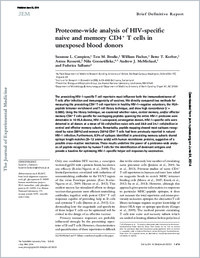Proteome-wide analysis of HIV-specific naive and memory CD4+ T cells in unexposed blood donors
- Campion, Suzanne L. Nuffield Department of Medicine Research Building, University of Oxford, Old Road Campus, Headington, Oxford OX3 7FZ, England, UK
- Brodie, Tess M. Institute for Research in Biomedicine (IRB), Faculty of Biomedical Sciences, Università della Svizzera italiana, Switzerland
- Fischer, William Theoretical Biology and Biophysics Group, Los Alamos National Laboratory, Los Alamos, NM 87545
- Korber, Bette T. Theoretical Biology and Biophysics Group, Los Alamos National Laboratory, Los Alamos, NM 87545
- Rossetti, Astrea Institute for Research in Biomedicine (IRB), Faculty of Biomedical Sciences, Università della Svizzera italiana, Switzerland
- Goonetilleke, Nilu Department of Microbiology & Immunology, University of North Carolina, Chapel Hill, NC 275994 - Department of Medicine, University of North Carolina, Chapel Hill, NC 27599
- McMichael, Andrew J. Nuffield Department of Medicine Research Building, University of Oxford, Old Road Campus, Headington, Oxford OX3 7FZ, England, UK
- Sallusto, Federica Institute for Research in Biomedicine (IRB), Faculty of Biomedical Sciences, Università della Svizzera italiana, Switzerland
-
23.06.2014
Published in:
- Journal of experimental medicine. - 2014, vol. 211, no. 7, p. 1273-1280
English
The preexisting HIV-1–specific T cell repertoire must influence both the immunodominance of T cells after infection and immunogenicity of vaccines. We directly compared two methods for measuring the preexisting CD4+ T cell repertoire in healthy HIV-1–negative volunteers, the HLA-peptide tetramer enrichment and T cell library technique, and show high concordance (r = 0.989). Using the library technique, we examined whether naive, central memory, and/or effector memory CD4+ T cells specific for overlapping peptides spanning the entire HIV-1 proteome were detectable in 10 HLA diverse, HIV-1– unexposed, seronegative donors. HIV-1–specific cells were detected in all donors at a mean of 55 cells/million naive cells and 38.9 and 34.1 cells/million in central and effector memory subsets. Remarkably, peptide mapping showed most epitopes recognized by naive (88%) and memory (56%) CD4+ T cells had been previously reported in natural HIV-1 infection. Furthermore, 83% of epitopes identified in preexisting memory subsets shared epitope length matches (8–12 amino acids) with human microbiome proteins, suggestive of a possible cross-reactive mechanism. These results underline the power of a proteome-wide analysis of peptide recognition by human T cells for the identification of dominant antigens and provide a baseline for optimizing HIV-1–specific helper cell responses by vaccination.
- Language
-
- English
- Classification
- Medicine
- License
- Open access status
- hybrid
- Identifiers
-
- RERO DOC 324231
- DOI 10.1084/jem.20130555
- ARK ark:/12658/srd1318830
- Persistent URL
- https://n2t.net/ark:/12658/srd1318830
Statistics
Document views: 218
File downloads:
- Texte intégral: 184
